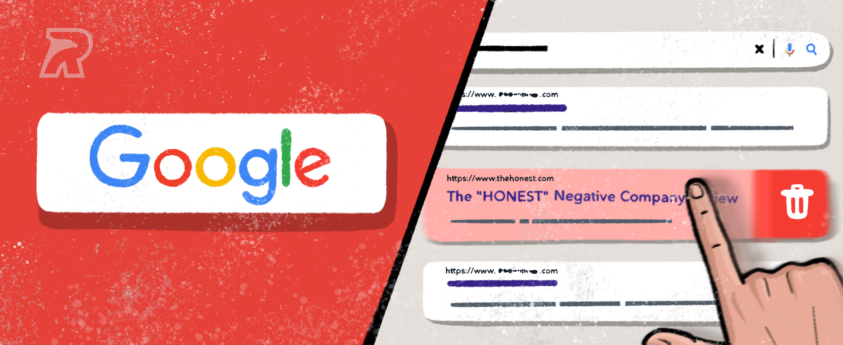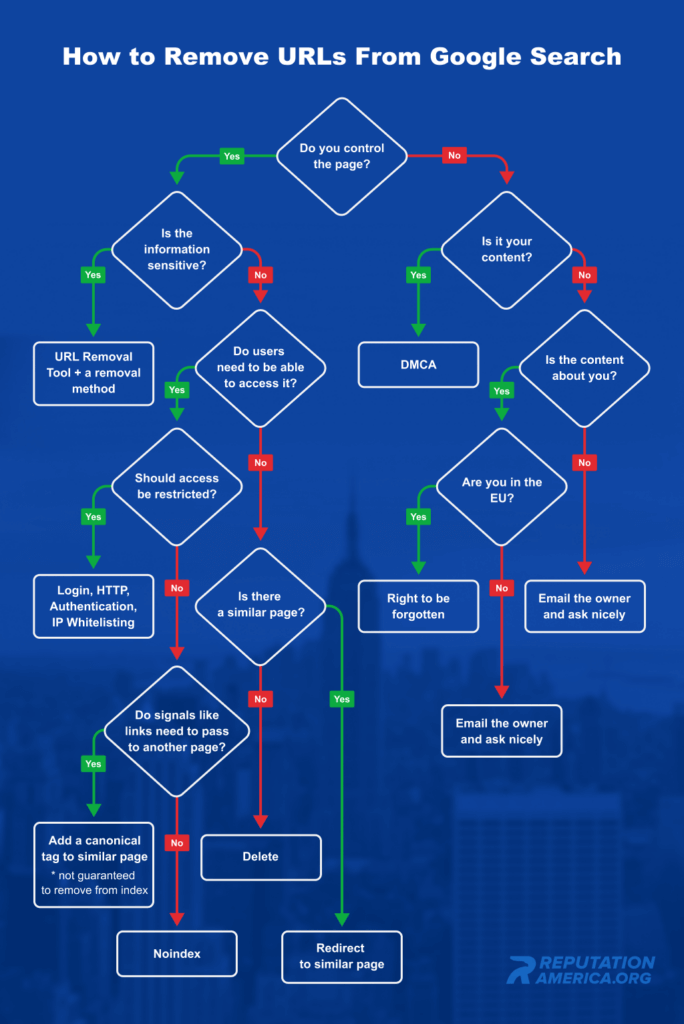A Simple Guide: How to Remove A Page From the Google Index

The legal actions you can take to pursue Google index removal on an external site.
In the age of the Internet that we live, the transmission of information can be scary-fast and difficult to control. When this occurs, you have found yourself in a position where your hard-earned reputation online is being dragged through the mud and you feel helpless to stop it. If this is happening to you, we understand the fear, and that’s why we’re here to help.
План статьи

We will help to protect your reputation in your hour of need
It’s free, confidential, and without obligation
Whether it’s a bad review, feedback from offended employees, or a custom article, these pages can ruin your reputation for years to come, so if it’s shown on the first or second page of Google, we recommend removing the link right away.
Below breaks down the extent of the problem you face when you lose control of your online reputation and the steps you can take to permanently remove a URL from Google’s Index. We’ll first start with what you can do if you control the page or content, then we’ll get into the legal actions you can take to pursue Google index removal on an external site.
How to Remove a Link from the Google Index when You Own the Content or Page

The first thing you want to determine when information gets out is who exactly has ownership of the content. If you are the one in control of the content and/or page, then there are some clear steps you should take:
- The first thing you should do is make sure your page is actually indexed on Google (false alarms are possible). Some recommendations will tell you all you need to do is a “site:” query in Google to find the offending page. For example, if your site was CNN.com, you would type the following into the Google Search Bar:

This isn’t a foolproof approach. We recommend using the Index Coverage report in the free Google Search Console tool to make sure your page is indexed. Below is a screenshot of how to find this report:

If the content is indeed indexed, you can move on to one of the two next steps:
2a. If you don’t need the page: Now the most obvious next step would be to delete the page with damaging content which will create a 404 or 410 error for Google, and they’ll stop indexing the page the next time your site is crawled. This is straightforward and works, as long as you don’t need that page.
2b. If you do still need the page: Whether for structural reasons or to provide for specific users, you may still need your page. If this is the case, then you need to create a noindex robots tag, which is basically a bit of code that tells crawlers to remove the site from the Google index. The screenshot below explains how to make this happen.

- If all else fails, your last option would be to have users login to access specific pages so that you can control who has access to the information. This can get a bit technical, so you can learn more about how to make this happen here.
How to Remove URL from Google Index When You Don’t Own the Content or Page
When you don’t own the content that you want to remove from the Google index things get a bit trickier. Sometimes it can be a quick fix, but oftentimes the page is going to be up for much longer than you would like.
When you first see that there has been an article published that you don’t want online, the first step to take is actually very simple:
-
- If you can find the author of the article, either ask him/her to rewrite the article or take it down completely. If the information in the article is simply incorrect, most authors will want to set the record straight. Even if you are upset or even angry, you must be polite, or there is a high risk of the situation getting worse.
- If you can’t find the author, you can also reach out to the platform. Authors come and go, and their contact information is usually purposely hard to find (finding their social media profiles is sometimes the best bet in this situation). A publication has a reputation of their own to uphold though, so if you prove to them that the information is false, they will be obligated to correct the information or take it down. Keep in mind that in today’s world, most content is created by users, so the administration may not have noticed anything was incorrect. Be sure that the tone of the email you send is polite and without harsh accusations, and if you don’t get an answer from them the first time, be sure to send a few follow-up messages just in case you got sent to spam.
- If the site administration ignores official mail requests, you should write to the owner of the domain itself. Copy the domain name in the address bar of your browser, and then use services to view the WHOIS history (such as GoDaddy).
- If you can’t fix it with the site or domain, you should send a request to the search engine directly. Google has several forms for different cases. Here are some of them. If you need to remove some outdated content use this, if it is a legal matter, this.
- If all else fails, remove the link through the court. If you think that the posted material negatively affects your reputation, you can try to remove the link from Google through the court. It is most difficult to win in court if the material does not contain any facts and is a mostly subjective opinion, so be sure to consider the facts when deciding if you want to take this route. In most cases, the court is long and expensive, amounting to several tens of thousands of dollars. Not every bad article is worth such funds and the cost of time.
- If you can find the author of the article, either ask him/her to rewrite the article or take it down completely. If the information in the article is simply incorrect, most authors will want to set the record straight. Even if you are upset or even angry, you must be polite, or there is a high risk of the situation getting worse.
How to Make a Choice When You Don’t Know What To Choose
It is not always possible to remove a page from the Google index on your own. Going to court is long, expensive, and potentially public, and even with a court decision, nothing prevents the authors of the negativity from turning on a VPN and spreading information through new accounts. Reputation America will help you remove the page from search results with a lifetime guarantee. Information removal and conflict resolution specialists, negotiators, and lawyers will get to work to help make it happen. We have legally and safely removed 700+ web pages with negative information and 2000+ negative reviews.
All of the above methods have risks, so the safest and most effective solution is to contact professionals. Simply order a callback and you will receive a full analysis of your situation, advice, and a description of nuances of the work for your particular case. Start taking care of your reputation today!
Still have questions?
It’s free, confidential, and without obligation






У этой статьи пока нет комментариев, но вы можете быть первым